🎗️Lonny's War Update- October 451, 2023 - December 30, 2024 🎗️
🎗️Day 451 that 100 of our hostages in Hamas captivity
**There is nothing more important than getting them home! NOTHING!**
“I’ve never met them,But I miss them. I’ve never met them,but I think of them every second. I’ve never met them,but they are my family. BRING THEM HOME NOW!!!”We’re waiting for you, all of you.
A deal is the only way to bring
all the hostages home- the murdered for burial and the living for rehabilitation.
#BringThemHomeNow #TurnTheHorrorIntoHope
A deal is the only way to bring
all the hostages home- the murdered for burial and the living for rehabilitation.
#BringThemHomeNow #TurnTheHorrorIntoHope
There is no victory until all of the hostages are home!אין נצחון עד שכל החטופים בבית
Red Alerts - Missile, Rocket, Drone (UAV - unmanned aerial vehicles), and Terror Attacks and Death Announcements
*4:35pm yesterday - South - Gaza Envelop - 5 rockets launched from Beit Hanoun in Gaza at Nir Am, Sapir College, Sderot, Givim, Ibim - 2 intercepted, 3 fell in open areas - no reports of injuries or damage
*An IDF soldier was killed in the northern Gaza Strip earlier today, the military announces.
The slain soldier is named as Staff Sgt. Yuval Shoham, 22, of the 401st Armored Brigade’s 9th Battalion, from Jerusalem.
MAY HIS MEMORY BE A REVOLUTIONThe IDF does not detail the circumstances of Shoham’s death.
The killing brings Israel’s toll in the ground offensive against Hamas in Gaza and in military operations along the border with the Strip to 394.
Separately, a soldier with the Nahal Brigade’s 931st Battalion was seriously wounded during fighting with Hamas operatives in northern Gaza’s Beit Hanoun today, the military adds.
An IDF soldier was killed in the northern Gaza Strip earlier today, the military announces.
The slain soldier is named as Staff Sgt. Yuval Shoham, 22, of the 401st Armored Brigade’s 9th Battalion, from Jerusalem.
The IDF does not detail the circumstances of Shoham’s death.
The killing brings Israel’s toll in the ground offensive against Hamas in Gaza and in military operations along the border with the Strip to 394.
Separately, a soldier with the Nahal Brigade’s 931st Battalion was seriously wounded during fighting with Hamas operatives in northern Gaza’s Beit Hanoun today, the military adds.
Hostage Updates
- Teens forced to perform sexual acts on each other: Report to UN details Hamas tortureGovernment document compiles grim details of abuse of hostages, including whipping, branding with heated iron, isolation, binding, starving, maltreatment and psychological torment
While in captivity in Gaza last year, two Israeli teenage hostages were forced to perform sexual acts on one another, and their captors sexually abused them, according to new details from a Health Ministry report set to be presented to the United Nations.
The testimony and many other damning details are included in a report cataloging the physical, sexual and mental anguish the now-former hostages — some of them children — were subjected to, and the lasting effects it has had on them.
It is set to be submitted this week to Alice Edwards, the UN’s special rapporteur on torture and other cruel, inhuman or degrading treatment or punishment.
Compiled from the testimonies of hostages who were released under a November 2023 deal and those who were rescued by Israeli forces, the report details how they were burned and beaten, starved and humiliated, as well as how the abuse impacted their mental and physical health even long after they were freed.
It marks the first formal report by the Health Ministry about the hostages’ experiences.
However, some of the most graphic details included in a Hebrew-language copy of the report issued by the ministry, were absent from the English-language version. It was unclear why there was a discrepancy or which version would end up being filed to the UN.
While the Health Ministry did not answer a Times of Israel query on the matter on Sunday, the Ynet news site quoted an unnamed ministry source claiming the discrepancy was an “honest mistake that will be fixed before the report is filed to the UN.”
WARNING: GRAPHIC CONTENT
To protect the hostages’ identities, their names, ages and family statuses — as well as their genders, in the cases of minors — were not included.
According to the report, the terrorist captors forced two minors to perform sexual acts on one another and compelled them to take off their clothes in front of them, touched their private parts, and whipped their genitalia.
The same two former hostages also reported that “they were held bound and were beaten throughout their captivity. Signs of binding, scars, and marks consistent with trauma were found,” the report says.
“Additionally, two young children had burn marks on their lower limbs,” the report adds. “One child stated that the burns were the result of a deliberate branding with a heated object. Both the child and adults who were with him in captivity described the incident as a purposeful branding event, not an accident. It was described as an extremely traumatic experience.”
The report says that some hostages were kept for days in darkness, with their hands and feet bound, and received little food or water. They were beaten all over their bodies, and some had hair pulled out.
“One of the returned hostages described being sexually assaulted at gunpoint by a Hamas terrorist,” the report says. “On several occasions, captors forced women of all ages to undress while others, including the captors, watched. Some women reported that the captors sexually assaulted them. In addition, some women reported that they were tied to beds while their captors stared at them.”
Illustrative: Hamas and Islamic Jihad terrorists stand guard as a Red Cross vehicle transports newly released hostages in Rafah, in the southern Gaza Strip on November 28, 2023. (Flash90)Israel has previously presented reports and released testimonies from hostages detailing sexual abuses in captivity, which Hamas has denied.
Some former hostages have spoken publicly. Earlier this year, freed hostage Amit Soussana told The New York Times of how she was forced to perform “a sexual act” on one of her captors.
Conditions were ‘designed to torture the hostages psychologically’
A total of 251 hostages were abducted from Israel on October 7, 2023, during the Hamas-led onslaught in southern Israel that killed 1,200 people.
Ninety-six of them remain in Gaza, including the bodies of at least 34 confirmed dead by the IDF. Hamas released 105 civilians during a weeklong truce in late November, and four hostages were released before that. Eight hostages have been rescued by troops alive, and the bodies of 38 hostages have also been recovered, including three mistakenly killed by the Israeli military as they tried to escape their captors.
A poster showing hostages held in the Gaza Strip, displayed at Hostages Square in Tel Aviv, December 22, 2024. (Miriam Alster/FLASH90)Released hostages related to authorities that they were deliberately separated from other family members who were being held. In one case, a woman was held in complete isolation, in darkness, bound, receiving very little water and food and not getting treatment for injuries.
“The hostages were denied medical treatment for acute injuries caused during October 7 and subsequently, in addition to for untreated chronic conditions,” the document says. “Fractures, shrapnel wounds, and burns were treated inadequately, leading to complications which required additional surgeries, that could have been prevented with proper care.
“The captors also tortured those injured by performing painful procedures without anesthesia. Many hostages also suffered from untreated chronic conditions (e.g., heart failure, diabetes, hypothyroidism), leading to severe short-term medical deterioration. In one case a hostage died from untreated medical complications,” it goes on.
Captives, including children, were forced to watch videos of the October 7 atrocities. Many of the terrorists who took part in the attack filmed it, including extreme acts of cruelty.
The men, meanwhile, “endured severe physical abuse, including continuous starvation, beatings, burns with galvanized iron (branding), hair-pulling, confinement in closed rooms with a limited amount of food and water, being held in isolation with hands and feet tied, and being denied access to the bathroom, which forced them to defecate on themselves.”
This image released by the IDF on January 20, 2024, shows the inside of a Hamas tunnel in southern Gaza’s Khan Younis where hostages were held. (Israel Defense Forces)The report says that the captivity “was designed to torture the hostages psychologically, break their morale, and make them easier to control. Their time in captivity was marked by intense trauma: family separation, immobilization, arbitrary and frequent transfers, and exposure to further violence.”
Some hostages, the document says, “witnessed the killing of other hostages, further deepening their sense of helplessness and hopelessness.
“In captivity, the hostages were often subjected to solitary confinement, poor sanitation, severe medical neglect, lack of sleep, starvation, sexual abuse, violence, threats, and brainwashing through media designed to break their spirit and make them submissive.”
Deliberate starvation and pre-release excess feeding
According to the report, “about half of the returned hostages described being deliberately starved during their captivity. They were given a poor diet, which often led to hunger that worsened over time. In addition to inadequate nutrition, they were kept in dark spaces, increasing the risk of vitamin D deficiency.”
Adult hostages lost an average of eight to 15 kilograms (18 to 33 pounds) — 10-17 percent of their original body weight — while among child captives there was an average loss of 10% in body weight, though in one extreme case, a girl lost as much as 18% of her weight.
The report says that as last year’s ceasefire deal approached, the captors gave the hostages more food and provided them with fresh clothes, apparently in an attempt to present their conditions as better than they were.
“Those who received excess food before returning to Israel were at risk of Refeeding Syndrome and electrolyte imbalances such as hypokalemia, hypomagnesemia, and hypophosphatemia, particularly among elderly hostages. In cases with complex medical backgrounds, these electrolyte disorders can be life-threatening,” the report says.
This image released by the IDF on January 20, 2024, shows the inside of a Hamas tunnel in southern Gaza’s Khan Younis where hostages were held. (Israel Defense Forces)The practice raised concerns among Israeli authorities as to the health dangers of eating too much food immediately after a period of starvation. In particular, authorities are concerned about the fate of the remaining hostages who have now been held for over 440 days in captivity. Efforts are ongoing to finalize another, mediated ceasefire to release more hostages, and authorities are concerned their captors may also try to overfeed them before a potential release.
Troubles continue even after return
Even after returning home, some adults and children suffered acute anxiety and panic attacks, as well as sharp mood swings that include extreme depression, the report says.
“Even those who appeared strong initially showed difficulties adjusting to reality, sometimes experiencing dissociative episodes,” it says. “Some returned hostages had paranoid anxieties, fearing retaliation against their loved ones still in captivity if they spoke about their experiences.”
Some had difficulty leaving home or speaking above a whisper, a reflection of the silence that some were ordered to maintain by their captors. Some were unable to return to their regular lives, whether at work or school.
Former hostages have had difficulty sleeping at night, while some, in particular children, suffer sharp pains that have no medical explanation. Some hostages have eating disorders, either eating too little or overeating. Some children secrete food away.
IDF soldiers walk past a door covered with portraits of Israelis held hostage by terror groups in Gaza since Hamas’s October, 2023, massacre, on a street in west Jerusalem on December 5, 2024. (Hazem Bader/AFP)Some reported “severe nightmares and sleep deprivation, trying to avoid repeating nightmares. Some experienced derealization, struggling to accept their presence in the Israeli hospital as real, rather than a dream from captivity. They avoided anything that reminded them of their traumatic experiences, including certain foods,” the report says.
Many returned hostages “experience fear, restlessness, emotional detachment, and confusion. Some were afraid to leave their rooms, even in the hospital’s protected areas.”
Doctors and psychologists who compiled the report noted that the released hostages said they are unable to fully recover while they know there are others still being held.
Some have “survivor’s guilt,” feeling responsible for being rescued while their loved ones remain in Gaza.
Health Minister Uriel Buso said in a statement last week that it is “a significant report that depicts the atrocities that hostages suffered and reveals to the world the cruelty of the enemies we are dealing with.”
“The testimonies brought here are a wake-up call to the world to put more pressure on Hamas and its supporters to release all of them [the remaining hostages] now,” Buso said.
The Hostages and Missing Families Forum said the report painted “a grim reality of the physical abuse and psychological torment” endured by the hostages.
It urged a comprehensive deal “to secure the immediate release of all hostages.” LINK. On the radio today, a question was asked if the government ministers received this report as well and it was stated that they probably did. There are presently an unheard 33 ministers and 4 deputy ministers in this government. How can it be that these 37 people can read this document and not reach the conclusion that everything must be done to release the 100 hostages still in captivity in Gaza? How can they sleep at night, eat their meals, enjoy their lives, with the knowledge that they have the power to bring them home and they are not doing so because their seats are too important to them? How is it that we have 2 extremist ministers who continuously threaten breaking up the government if a deal which includes ending the war, is made, yet we don't have a single minister who threatens the break up of the government if a deal isn't made? At what point did they lose their collective humanity, disperse with empathy and sympathy, destroy any moral compass that they may have had at some point in their pitiful lives? How can they look in the faces of the hostage families and not get down on their knees begging forgiveness for abandoning them on October 7 and continuing to abandon them for 451 days while their loved ones are dying and being killed, tortured, raped, starved, all on their watch? How? How? How?
- Fallen soldier knew hostage Goldberg-Polin: He went around Gaza looking for him and shouting ‘Hersh’
The brother of Staff Sgt. Yuval Shoham, 22, killed yesterday in Gaza, says the fallen soldier knew murdered hostage Hersh Goldberg-Polin and looked for him while serving in the Strip.
“The concept of bringing back the hostages was in his heart,” Shahar Shoham tells Ynet. “He knew Hersh Goldberg-Polin personally and the fact that he was there [in Gaza] connected him even more. He went around Gaza looking for him and shouting ‘Hersh.'”
The Shoham and Goldberg-Polin families were friends and members of the same community in Jerusalem.
Shahar says that yesterday his parents had traveled south from their Jerusalem home with a package for Yuval, but when they arrived at his base they were met by officers who informed them of his death. The army announced the circumstances of his death earlier today, saying he was killed in an accident during fighting in the Jabalia area.
Goldberg-Polin was taken hostage from the Nova festival on October 7. He was killed by his captors alongside Eden Yerushalmi, Ori Danino, Alex Lobanov, Carmel Gat, and Almog Sarusi in a tunnel in Rafah on August 29.
The IDF has updated the family of Staff Sgt. Yuval Shoham, who was killed yesterday in the northern Gaza Strip, that his death was caused by an accident.
Shoham, 22, of the 401st Armored Brigade’s 9th Battalion, was hit by the rotation of the turret in the tank he was in, during fighting in the Jabalia area.
“His family was informed of the circumstances of the incident. The IDF shares in the grief of the family, and will continue to accompany them,” the military says.
- The Haunting Video and the Father's Plea at His Fallen Son's Funeral: "Prime Minister, Pursue a Deal!"
Sergeant First Class Yuval Shoham was killed in a tank rotation accident during an operational mission in Gaza. At his funeral on Mount Herzl, his father, Efi Shoham, appealed directly to Prime Minister Netanyahu: "Above my son's grave, I demand of you—make a deal." A year and a half earlier, in an interview for Tisha B’Av, the mother of Shir Hajaj, who was murdered in a terrorist attack, told him: "There will be no civil war. All the children are buried together on Mount Herzl. There is no left or right there."
Thousands attended the funeral this afternoon (Monday) in pouring rain at Mount Herzl to bid farewell to Sgt. First Class Yuval Shoham, who was killed yesterday in a tank rotation accident in Jabalia, in northern Gaza. "I call on the Prime Minister—pursue a deal now," said his father, Professor Efi Shoham.
At the beginning of the funeral, mourners sang Lema'an Achai Ve'Re'ai ("For the Sake of My Brothers and Friends"), and Yuval’s grandfather, Elisha, eulogized him:
"Heavens, seek mercy. How hard it is to eulogize a beloved grandson. My dear grandson Yuval, can you hear me? Do you know? Yuval, how you opposed those who defame the land. You fell as a hero in a just existential war. You brought us all calm. You were a role model for honoring parents. Thanks to you and your heroic comrades, it is fulfilled in us, ‘And Judah shall dwell forever, and Jerusalem from generation to generation.’ The land is very, very good. Rest in peace."
Yuval's father, a member of "Guardians of the Shared Home," continued in his eulogy:
"I call on the Prime Minister—Sir, it’s no secret that we don’t see eye to eye. But here, above my son’s fresh grave, I demand of you in his name and the names of so many others—make a deal. Make a deal! Our loved ones are fighting in Gaza so that the hostages can return. There is a spirit among the people, and there is a majority among the people. Pursue a deal now! And to you, my beloved Yuvali, I promise in my name, your mother’s name, and the community’s name—we will walk the path you walked. Your private flame has, unfortunately, been extinguished, but your light will shine forever."
A year and a half ago, in July 2023, as part of a Tisha B’Av article for Ynet, Shoham, a vocal opponent of the judicial reform, met with two supporters of the reform, including Merav Hajaj, the mother of Captain Shir Hajaj, who was killed in a terrorist attack in Jerusalem in 2017. During the meeting, Hajaj said something to Shoham that now feels even more chilling:
"There will be no civil war. All the children are buried together on Mount Herzl. There is no left or right there. We are all together."
Sgt. First Class Yuval Shoham, 22, from Jerusalem, served as a tank crewman in the 9th Battalion of the 401st Armored Brigade ("Iron Tracks"). This morning, the IDF Spokesperson reported that following an investigation into his death, it was confirmed to have resulted from an operational accident in the tank. Yuval, a graduate of the Himelfarb High School in Jerusalem, was the school’s tenth fallen soldier in this war.
Yuval’s parents were on their way to a Hanukkah trip in southern Israel yesterday and planned to bring him a package. When they arrived at the base, casualty officers were waiting to inform them of his death. Beforehand, Yuval had managed to send them one last message. link
Gaza and the South
- Senior IDF Officials: "Develop an Alternative to Hamas Before Any Deal, or We'll Return to October 6"
Senior military officials are repeatedly warning Prime Minister Netanyahu that the absence of a clear policy for Gaza will lead to a situation where the heavily damaged terrorist organization will regain governance capabilities—even in the framework of a "small deal." "We are forfeiting the achievements of the war," they warned. To "collapse Hamas rule," Israel must decide between transferring governance to the Palestinian Authority or establishing military administration—both options Netanyahu rejects. A similar situation exists in the West Bank, with concerns that the Gaza reality will spill over there.
Repeated Warnings
Over recent months, vast regions of the Middle East have undergone significant changes, yet some issues seem stuck in a time loop. Just as in the early days of the ground maneuver in Gaza, when the IDF achieved surprising successes, senior defense officials continue to warn: "The lack of planning for the day after in Gaza will bring us back to October 6." It’s that simple.
These officials, well-versed in the political and security situation, support a full or partial ceasefire agreement in the immediate term. Prime Minister Benjamin Netanyahu, at least, cannot claim ignorance. The same officials have repeatedly warned him that failure to deliberate and decide on the management and civilian control of Gaza post-war will allow Hamas to rebuild its governance and continue managing the territory.
"In the absence of an alternative," these officials say, "Hamas governance will inevitably return. A decision must be made now, before any deal. Even a 'small deal' will restore Hamas to full control. Without a decision, we are forfeiting the war's achievements and failing one of its primary objectives—collapsing Hamas."
A Fragile Situation
This position is shared by senior officials in both the IDF and the Shin Bet. While Hamas's military capabilities have been nearly wiped out, its governance abilities remain intact. This can be attributed to the humanitarian zone in central southern Gaza, where 1.9 million residents—90% of Gaza's population—are concentrated. The IDF has minimal presence in this area, apart from surgical, mostly aerial, operations. Residents see Hamas officials, who rule with brutality and violence, but no IDF soldiers. Attempts to challenge Hamas are met with harsh and public punishment, serving as a deterrent both in Gaza and in Israel.
A senior officer explained why there isn’t a civilian uprising against Hamas: "Any family or clan that tries to rise up is immediately suppressed. But the greater problem lies in two factors: there is no leadership for rebellion, as seen in Syria, and the public lacks energy for resistance."
Three Options for Gaza
"Collapsing Hamas rule" is a critical goal but remains a slogan without a clear strategy. According to senior military sources, three options exist:
1- Restoring the Palestinian Authority: With financial support from the U.S. and Gulf states, this option would push Hamas out of governance. A historic normalization agreement between Israel and Saudi Arabia could further reshape the Middle East. However, Netanyahu opposes this option, citing coalition pressures and difficulty garnering support from Likud and Gideon Sa'ar's party base.
2- Military Administration: Israeli forces would distribute food, manage healthcare and welfare infrastructures, and bear the associated costs alongside Israel's already burdensome cost of living. Netanyahu rejects this option due to its economic and international ramifications, including a potential arrest warrant against him.
3- Inaction: The third, most concerning option is failing to make any decision. This would lead to Hamas inevitably rebuilding its governance.
Parallels with the West Bank
The indecision regarding Gaza echoes in the West Bank, where calls from the political right to dismantle the Palestinian Authority have intensified. However, Netanyahu has been slow to act. Meanwhile, Abu Mazen’s security forces fight Hamas to prevent its rise just a short distance from Israeli cities. "Last week alone, five of Abu Mazen's men were killed fighting Hamas," said a senior official.
Israel refrains from dismantling or strengthening Abu Mazen's rule, effectively eroding his authority incrementally. Without an alternative governing body, the path from Gaza to the West Bank isn’t far. "Hamas is trying to ignite the West Bank, and Abu Mazen is fighting them," the official noted. "Palestinians tell us, 'If we’re not strong, Hamas will rise, and it will be your problem too. So why do you publicly oppose us?'"
A Strategic Crossroads
Currently, 21 battalions are stationed in the West Bank. If the Palestinian Authority collapses without a governing alternative, 40 battalions will be required—resources Israel does not have. Defense officials emphasize they are not advocating for a Palestinian state or territorial concessions but rather pragmatic decisions to secure Israel's borders and citizens.
The October 7 attack taught Israel to stop turning a blind eye. But beyond vigilance, Israel cannot afford to delay critical decisions. The defense establishment needs reform, including replacing much of its leadership. Yet the pressing need is to face the public with honesty: difficult but necessary steps are better than temporary quiet and wishful thinking. Harsh experience has shown that ignoring problems only makes them worse.
Israel says several October 7 terrorists among Hamas operatives killed last month
The IDF and Shin Bet say that 14 members of Hamas, including six who participated in the October 7 onslaught, were eliminated in a series of operations and airstrikes in the northern Gaza Strip last month, adding them to previously announced tallies for November.
The announcement is made by the IDF and Shin Bet, after verifying the results of the operations last month.
Aside from battling Hamas in the Strip’s far north, troops are also working to hunt down and kill terrorists who invaded Israel on October 7, 2023, the military and Shin Bet say.
In one incident on November 27, the IDF says troops of the Givati Brigade raided a Hamas position in Jabalia, where they killed Muhammad Abd al-Hamid Salah, a Hamas terrorist who “participated in the murderous massacre on October 7.”
Another two Hamas commanders were killed in the same operation, according to the military.
The IDF says an airstrike in Jabalia on November 26 killed Rasem Jawda, a Hamas company commander, Zahar Shahab, and Ali Ramadan, all of whom it says participated in the October 7 onslaught. Another two Hamas commanders were also killed in the strike, the military says.
A separate strike on an unspecified date last month killed Muhammad Hamuda, who also participated in the October 7 attack, the IDF says. With him, five more Hamas operatives were killed, the military adds.
The military had already claimed to have killed hundreds of Hamas operatives in the Strip’s far north in November. link. Since the beginning of the war, the question about the day after was being asked, first by my brother and then months later by others especially in the security forces: IDF, Shin Bet, Mossad, and Netanyahu refused to deal with it saying the day after will be decided at the end of the war. Typical refusal to plan strategically, Netanyahu has brought us to the situation we are in today where Hamas still governs the Gaza Strip and there is no alternative in its place. All the lives lost, all the military accomplishments, most of Gaza physically destroyed and he still refuses to put in a Palestinian alternative to Hamas which would solve so many of the problems that are currently being faced and all those in the future. His paralysis is the burden on the country, soldiers being killed daily, 2 million Gazan refugees, collapsing economy that will only get worse if we will have a military presence there, huge numbers of soldiers there indefinitely, extension of mandatory military service and longer requirements for reserve duty and the list goes on. The damage that Netanyahu's inaction and refusal to act are costing us dearly and he doesn't seem to give a damn. More disgraceful behavior by the most dangerous person in Israel today.
Fourth newborn dies of hypothermia in cold, wet Gaza, father says
A fourth infant has died of hypothermia in the Gaza Strip, where hundreds of thousands of Palestinians displaced by nearly 15 months of war are huddled in tents along the rainy, windswept coast as winter arrives.
Jomaa al-Batran, 20 days old, was found with his head as “cold as ice” when his parents woke up Sunday, his father Yehia says. The baby’s twin brother, Ali, was moved to the intensive care unit of Al-Aqsa Martyrs Hospital.
Their father says the twins were born one month premature and spent just a day in the nursery at the hospital, which like other health centers in Gaza has been overwhelmed and is only partially functioning.
He said medics told their mother to keep the newborns warm, but it was impossible because they live in a tent and temperatures regularly drop below 10 degrees Celsius (50 degrees Fahrenheit) at night.
“We are eight people, and we only have four blankets,” al-Batran says as he cradles his son’s pale body. He described drops of dew seeping through the tent cover overnight. “Look at his color because (of) the cold. Do you see how frozen he is?”
An imam prays over the shrouded infant, who is laid at his feet and is barely larger than his shoes. After prayers, the imam takes off his ankle-length coat and wraps it around the father.
“Feel warm, my brother,” he says.
At least three other babies have died from the cold in recent weeks, according to health officials in the Hamas-run enclave.
Rainy and stormy weather in the region is expected to intensify over the next two days before slightly warmer conditions return later this week.
IDF warns Gazans to take shelter as army readies to hit Jabalia following rocket fire
The IDF has issued a fresh evacuation warning for civilians in a large area near the northern Gaza city of Jabalia following rocket fire into Israel.
“Terror organizations are again launching rockets from these areas that have been warned several times in the past,” Col. Avichay Adraee, the IDF’s Arabic-language spokesman says on X, attaching a map of the areas that are to be evacuated.
Civilians are urged to head for shelters in Gaza City before the IDF launches strikes on the area.
Five rockets were launched at Sderot an hour ago, marking the third day in a row of attacks from northern Gaza. Two were intercepted and three landed in open areas, according to authorities.Army says it nabbed hundreds of terror suspects at northern Gaza hospital, capping Jabalia offensive
Following the Israeli military raid on Kamal Adwan Hospital, army sources indicate that the IDF is close to completing its operations in northern Gaza’s Jabalia.
Kamal Adwan Hospital is being described by the IDF as “Hamas’s last bastion in Jabalia,” after hundreds of terror operatives allegedly used the medical facility as a shelter from Israeli strikes. According to the military, the terror operatives had returned to Kamal Adwan after the IDF last operated in the medical center in late October.
There is no way to verify the military’s claims.
The IDF has been operating in the Jabalia area since early October, facing relatively fierce resistance by remaining Hamas cells in the area, military sources say.
Before launching the operation, the IDF says it enabled the evacuation of 350 patients, caregivers, and medical personnel to other hospitals, in an effort coordinated by the Defense Ministry’s Coordinator of Government Activities in the Territories.
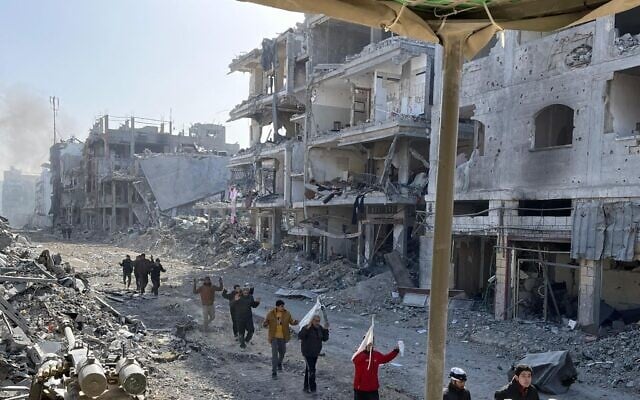 Palestinians evacuate from northern Gaza’s Kamal Adwan Hospital, in a handout photo issued by the military on December 29, 2024. (Israel Defense Forces)
Palestinians evacuate from northern Gaza’s Kamal Adwan Hospital, in a handout photo issued by the military on December 29, 2024. (Israel Defense Forces)The army says drone strikes killed the members of two Hamas cells who tried to run away the hospital as troops moved in. Within an hour, more civilians and patients fled the area under IDF instructions, the army says.
Patients, caregivers, and medical personnel were taken to the nearby Indonesian Hospital, where the IDF says it delivered fuel, generators, and other medical equipment from Kamal Adwan.
The army says it collared 240 terror suspects while screening nearly 950 people who passed through an army checkpoint outside the hospital. According to the IDF, among the 240 were at least 15 participated in the October 7, 2023, onslaught in Israel, and several others considered to be prominent commanders in Hamas and the Palestinian Islamic Jihad.
Some terror operatives posed as medical staff and patients, and some tried to leave in stretchers and ambulances, the army says.
The director of the hospital, Hussam Abu Safiya, was also detained. The IDF says he is suspected of being a Hamas operative.
The IDF says that the Kamal Radwan raid marks one of the largest single arrest operations in Gaza since the beginning of the war.
The IDF acknowledges that few weapons were found in the hospital itself, but says that numerous weapons were located and seized in apartments surrounding Kamal Adwan, which were used by Hamas as fighting positions, some of which were booby-trapped.
During the operation, the military says RPGs were fired at an armored personnel carrier from an area near the hospital, though there were no casualties.
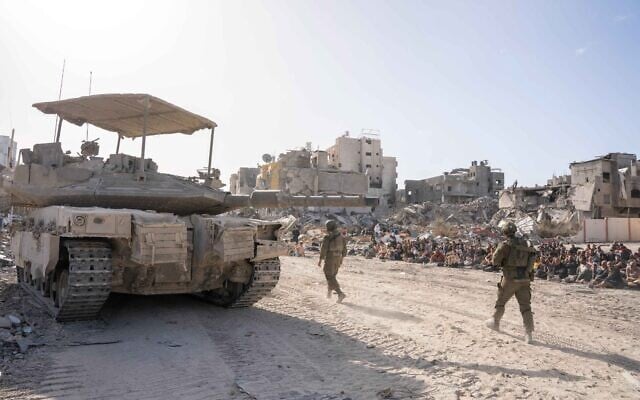 IDF troops are seen next to Palestinians who evacuated from northern Gaza’s Kamal Adwan Hospital, in a handout photo issued by the military on December 29, 2024. (Israel Defense Forces)
IDF troops are seen next to Palestinians who evacuated from northern Gaza’s Kamal Adwan Hospital, in a handout photo issued by the military on December 29, 2024. (Israel Defense Forces)In all, the IDF says it killed 19 terror operatives during the fighting around the hospital. Hamas authorities have claimed that around 50 Palestinians were killed, including medical staff at the hospital.
The IDF says it did not fire directly at the hospital, did not target any medical staff, and is unaware of civilian casualties in the operation.
The IDF says it has no plans to demolish the now-defunct medical facility following the raid
IDF says many dozens of terror operatives killed in overnight ambushes in north Gaza’s Jabalia
Overnight, dozens of terror operatives were killed in ambushes led by the IDF’s 162nd Division in northern Gaza’s Jabalia, the military says.
According to the IDF, troops spotted and killed “many dozens of terrorists” in Jabalia with gunfire and tank shelling.
The IDF says troops of the 401st Armored Brigade, Givati Infantry Brigade, and the elite Multidomain Unit had been waiting in ambushes overnight, following intelligence on plans by operatives to flee the area.
“Many terrorist squads were eliminated in ambushes by the forces, after they were seen fleeing with weapons in their hands,” the military says, releasing footage showing armed operatives running.
Fourth newborn dies of hypothermia in cold, wet Gaza, father says
A fourth infant has died of hypothermia in the Gaza Strip, where hundreds of thousands of Palestinians displaced by nearly 15 months of war are huddled in tents along the rainy, windswept coast as winter arrives.
Jomaa al-Batran, 20 days old, was found with his head as “cold as ice” when his parents woke up Sunday, his father Yehia says. The baby’s twin brother, Ali, was moved to the intensive care unit of Al-Aqsa Martyrs Hospital.
Their father says the twins were born one month premature and spent just a day in the nursery at the hospital, which like other health centers in Gaza has been overwhelmed and is only partially functioning.
He said medics told their mother to keep the newborns warm, but it was impossible because they live in a tent and temperatures regularly drop below 10 degrees Celsius (50 degrees Fahrenheit) at night.
“We are eight people, and we only have four blankets,” al-Batran says as he cradles his son’s pale body. He described drops of dew seeping through the tent cover overnight. “Look at his color because (of) the cold. Do you see how frozen he is?”
An imam prays over the shrouded infant, who is laid at his feet and is barely larger than his shoes. After prayers, the imam takes off his ankle-length coat and wraps it around the father.
“Feel warm, my brother,” he says.
At least three other babies have died from the cold in recent weeks, according to health officials in the Hamas-run enclave.
Rainy and stormy weather in the region is expected to intensify over the next two days before slightly warmer conditions return later this week.
IDF warns Gazans to take shelter as army readies to hit Jabalia following rocket fire
The IDF has issued a fresh evacuation warning for civilians in a large area near the northern Gaza city of Jabalia following rocket fire into Israel.
“Terror organizations are again launching rockets from these areas that have been warned several times in the past,” Col. Avichay Adraee, the IDF’s Arabic-language spokesman says on X, attaching a map of the areas that are to be evacuated.
Civilians are urged to head for shelters in Gaza City before the IDF launches strikes on the area.
Army says it nabbed hundreds of terror suspects at northern Gaza hospital, capping Jabalia offensive
Following the Israeli military raid on Kamal Adwan Hospital, army sources indicate that the IDF is close to completing its operations in northern Gaza’s Jabalia.
Kamal Adwan Hospital is being described by the IDF as “Hamas’s last bastion in Jabalia,” after hundreds of terror operatives allegedly used the medical facility as a shelter from Israeli strikes. According to the military, the terror operatives had returned to Kamal Adwan after the IDF last operated in the medical center in late October.
There is no way to verify the military’s claims.
The IDF has been operating in the Jabalia area since early October, facing relatively fierce resistance by remaining Hamas cells in the area, military sources say.
Before launching the operation, the IDF says it enabled the evacuation of 350 patients, caregivers, and medical personnel to other hospitals, in an effort coordinated by the Defense Ministry’s Coordinator of Government Activities in the Territories.

The army says drone strikes killed the members of two Hamas cells who tried to run away the hospital as troops moved in. Within an hour, more civilians and patients fled the area under IDF instructions, the army says.
Patients, caregivers, and medical personnel were taken to the nearby Indonesian Hospital, where the IDF says it delivered fuel, generators, and other medical equipment from Kamal Adwan.
The army says it collared 240 terror suspects while screening nearly 950 people who passed through an army checkpoint outside the hospital. According to the IDF, among the 240 were at least 15 participated in the October 7, 2023, onslaught in Israel, and several others considered to be prominent commanders in Hamas and the Palestinian Islamic Jihad.
Some terror operatives posed as medical staff and patients, and some tried to leave in stretchers and ambulances, the army says.
The director of the hospital, Hussam Abu Safiya, was also detained. The IDF says he is suspected of being a Hamas operative.
The IDF says that the Kamal Radwan raid marks one of the largest single arrest operations in Gaza since the beginning of the war.
The IDF acknowledges that few weapons were found in the hospital itself, but says that numerous weapons were located and seized in apartments surrounding Kamal Adwan, which were used by Hamas as fighting positions, some of which were booby-trapped.
During the operation, the military says RPGs were fired at an armored personnel carrier from an area near the hospital, though there were no casualties.

In all, the IDF says it killed 19 terror operatives during the fighting around the hospital. Hamas authorities have claimed that around 50 Palestinians were killed, including medical staff at the hospital.
The IDF says it did not fire directly at the hospital, did not target any medical staff, and is unaware of civilian casualties in the operation.
The IDF says it has no plans to demolish the now-defunct medical facility following the raid
IDF says many dozens of terror operatives killed in overnight ambushes in north Gaza’s Jabalia
Overnight, dozens of terror operatives were killed in ambushes led by the IDF’s 162nd Division in northern Gaza’s Jabalia, the military says.
According to the IDF, troops spotted and killed “many dozens of terrorists” in Jabalia with gunfire and tank shelling.
The IDF says troops of the 401st Armored Brigade, Givati Infantry Brigade, and the elite Multidomain Unit had been waiting in ambushes overnight, following intelligence on plans by operatives to flee the area.
“Many terrorist squads were eliminated in ambushes by the forces, after they were seen fleeing with weapons in their hands,” the military says, releasing footage showing armed operatives running.
Northern Israel - Lebanon/Hizbollah/Syria
- At least six reported killed in alleged Israeli strike near Damascus
Multiple casualties are being reported in an alleged Israeli airstrike on a weapons depot outside of Damascus.
According to al-Meyadeen, an outlet affiliated with allies of the deposed Assad regime, six people were killed in the strike near the Syrian capital.
The Syrian Observatory for Human Rights, a Britain-based war-monitor, reports 11 killed. The observatory, which relies on the sources on the ground in Syria, has been accused in the past of publishing inflated casualty numbers.
Unverified claims published on social media put the toll even higher. Footage from the strike shared online shows extensive damage to a building as rescuers comb through the rubble.
Earlier, Syria’s Sham FM radio reported that an explosion in the city of Adra, on the eastern outskirts of the capital, had killed several people.
There is no comment from Syrian or Israeli authorities.
The Head of the Jewish Community Returns to a Destroyed Synagogue in Damascus | Documentation
Following the fall of Assad's regime, the head of the Jewish community in Syria returned to visit the ruins of the "Eliyahu Hanavi" synagogue. Bekhor Hamantov, one of only nine Jews still residing in the country, insists on preserving the memory and restoring the site despite the complex circumstances. "I am Jewish, and I am proud of it," he said in an interview amidst the ruins of the ancient synagogue.
Bekhor Hamantov (right) on the ruins of the synagogue
The handful of Jews remaining in Syria can now revisit one of the world's oldest synagogues, located in a suburb of Damascus. The site, which served as a pilgrimage center for worshippers from across the region for centuries, has significant historical value.
The Syrian civil war, which lasted nearly 14 years, left the Jobar Synagogue—situated on the outskirts of Damascus—abandoned and partially destroyed. An Arabic sign hanging on the synagogue's gate indicates it was initially constructed in 720 BCE, making it one of the oldest synagogues in the world. However, some claim that it only began functioning in the Middle Ages.
Now, thanks to the overthrow of Assad's regime by rebel forces, worshippers who once frequented the site can return safely. On Thursday, Bekhor Hamantov, the head of the Jewish community in Syria, visited the ruins of the Jobar Synagogue, also known as the "Eliyahu Hanavi" synagogue. "This synagogue is very important to us," said Hamantov (74) to the Associated Press during his first visit in 15 years. He expressed concern over the damage the fighting had inflicted on the synagogue.
Syria was once home to one of the largest Jewish communities in the world, but the numbers dwindled significantly, especially after the establishment of the State of Israel in 1948. Today, only nine Jews remain in Syria, and forecasts predict that none will remain in the country in a few years.
Hamantov, who refused to leave Syria during the war (despite the fact that all 12 of his siblings left the country), said Jews from around the world have reached out to him with the intention of contributing to the restoration efforts of the synagogue. While other Jews preferred not to publicly disclose their identity for safety reasons—fearing they would be labeled collaborators—Hamantov spoke openly about his faith, noting that he had never experienced discrimination.
The Jobar Synagogue was built atop a cave where, according to local tradition, the prophet Elijah hid. After 1099, when Christian armies conquered Jerusalem during the First Crusade and massacred the city's Muslim and Jewish residents, around 50,000 Jews (about a third of Damascus' population) fled to the city. Another wave of Jews later arrived from Europe, escaping the Spanish Inquisition beginning in 1492.
At the beginning of the 20th century, Syria's Jewish community numbered around 100,000 people. However, following the establishment of the State of Israel, the community faced restrictions and growing tensions, leading to massive emigration to Israel, the United States, and other countries. Before the Syrian conflict began in 2011, Hamantov and the remaining community members would visit the Jobar Synagogue on Sabbaths to pray and read Torah scrolls written on deer parchment.
Hamantov with Malka, 86 in her home in Damascus
The synagogue was once lavishly decorated with chandeliers, wall hangings, and carpets—all looted by thieves over the years. Barakat Al-Azroumi, a Muslim who was born and raised near the synagogue, recounted how worshippers asked him to turn on the lights or light candles for them on the Sabbath. "It was a beautiful religious place," Al-Azroumi told AP about the synagogue, which was protected by rebels during the war until Assad's forces recaptured the area in 2018, subsequently barring access to the site. Now, Syria's new rulers have declared they will ensure full religious freedom.
As the Jewish community has dwindled, it has struggled to access kosher food. Hamantov receives (at least once a year) shipments of meat sent by relatives in the U.S., which are delivered via travelers to Syria. This is a substitute for the Jewish butcher who once performed kosher slaughter but is now too old to continue.
Given the circumstances, Hamantov has transitioned to eating primarily plant-based foods, cooking for himself and a Jewish woman in the area who lives without relatives. Hamantov hopes that with Assad's fall, economic and verbal freedoms will emerge—unlike in recent years, when he had to obtain approval from the regime and security officials to speak in interviews. "I am Jewish, and I am proud of it," Hamantov told AP. However, with so few Jews left in Syria, especially in Damascus, the city's synagogues remain desolate, forcing him to celebrate Hanukkah alone in his home. link
Multiple casualties are being reported in an alleged Israeli airstrike on a weapons depot outside of Damascus.
According to al-Meyadeen, an outlet affiliated with allies of the deposed Assad regime, six people were killed in the strike near the Syrian capital.
The Syrian Observatory for Human Rights, a Britain-based war-monitor, reports 11 killed. The observatory, which relies on the sources on the ground in Syria, has been accused in the past of publishing inflated casualty numbers.
Unverified claims published on social media put the toll even higher. Footage from the strike shared online shows extensive damage to a building as rescuers comb through the rubble.
Earlier, Syria’s Sham FM radio reported that an explosion in the city of Adra, on the eastern outskirts of the capital, had killed several people.
There is no comment from Syrian or Israeli authorities.
The Head of the Jewish Community Returns to a Destroyed Synagogue in Damascus | Documentation
Following the fall of Assad's regime, the head of the Jewish community in Syria returned to visit the ruins of the "Eliyahu Hanavi" synagogue. Bekhor Hamantov, one of only nine Jews still residing in the country, insists on preserving the memory and restoring the site despite the complex circumstances. "I am Jewish, and I am proud of it," he said in an interview amidst the ruins of the ancient synagogue.
The handful of Jews remaining in Syria can now revisit one of the world's oldest synagogues, located in a suburb of Damascus. The site, which served as a pilgrimage center for worshippers from across the region for centuries, has significant historical value.
The Syrian civil war, which lasted nearly 14 years, left the Jobar Synagogue—situated on the outskirts of Damascus—abandoned and partially destroyed. An Arabic sign hanging on the synagogue's gate indicates it was initially constructed in 720 BCE, making it one of the oldest synagogues in the world. However, some claim that it only began functioning in the Middle Ages.
Now, thanks to the overthrow of Assad's regime by rebel forces, worshippers who once frequented the site can return safely. On Thursday, Bekhor Hamantov, the head of the Jewish community in Syria, visited the ruins of the Jobar Synagogue, also known as the "Eliyahu Hanavi" synagogue. "This synagogue is very important to us," said Hamantov (74) to the Associated Press during his first visit in 15 years. He expressed concern over the damage the fighting had inflicted on the synagogue.
Syria was once home to one of the largest Jewish communities in the world, but the numbers dwindled significantly, especially after the establishment of the State of Israel in 1948. Today, only nine Jews remain in Syria, and forecasts predict that none will remain in the country in a few years.
Hamantov, who refused to leave Syria during the war (despite the fact that all 12 of his siblings left the country), said Jews from around the world have reached out to him with the intention of contributing to the restoration efforts of the synagogue. While other Jews preferred not to publicly disclose their identity for safety reasons—fearing they would be labeled collaborators—Hamantov spoke openly about his faith, noting that he had never experienced discrimination.
The Jobar Synagogue was built atop a cave where, according to local tradition, the prophet Elijah hid. After 1099, when Christian armies conquered Jerusalem during the First Crusade and massacred the city's Muslim and Jewish residents, around 50,000 Jews (about a third of Damascus' population) fled to the city. Another wave of Jews later arrived from Europe, escaping the Spanish Inquisition beginning in 1492.
At the beginning of the 20th century, Syria's Jewish community numbered around 100,000 people. However, following the establishment of the State of Israel, the community faced restrictions and growing tensions, leading to massive emigration to Israel, the United States, and other countries. Before the Syrian conflict began in 2011, Hamantov and the remaining community members would visit the Jobar Synagogue on Sabbaths to pray and read Torah scrolls written on deer parchment.
The synagogue was once lavishly decorated with chandeliers, wall hangings, and carpets—all looted by thieves over the years. Barakat Al-Azroumi, a Muslim who was born and raised near the synagogue, recounted how worshippers asked him to turn on the lights or light candles for them on the Sabbath. "It was a beautiful religious place," Al-Azroumi told AP about the synagogue, which was protected by rebels during the war until Assad's forces recaptured the area in 2018, subsequently barring access to the site. Now, Syria's new rulers have declared they will ensure full religious freedom.
As the Jewish community has dwindled, it has struggled to access kosher food. Hamantov receives (at least once a year) shipments of meat sent by relatives in the U.S., which are delivered via travelers to Syria. This is a substitute for the Jewish butcher who once performed kosher slaughter but is now too old to continue.
Given the circumstances, Hamantov has transitioned to eating primarily plant-based foods, cooking for himself and a Jewish woman in the area who lives without relatives. Hamantov hopes that with Assad's fall, economic and verbal freedoms will emerge—unlike in recent years, when he had to obtain approval from the regime and security officials to speak in interviews. "I am Jewish, and I am proud of it," Hamantov told AP. However, with so few Jews left in Syria, especially in Damascus, the city's synagogues remain desolate, forcing him to celebrate Hanukkah alone in his home. link
Syrian Kurdish officials have reached out to Israel to establish a channel of communication, The Times of Israel has learned.
Foreign Minister Gideon Sa’ar has been vocal about the imperative of supporting the Syrian Kurds. According to his office, he brings up the issue in all of his meetings with Western diplomats. link This is a good step as Israel and the Kurds have always enjoyed good relations. However, our failed government with its lack of strategic planning is failing to take advantage of the new situation in Syria and attempt to establish communications with the new Syrian Government. This is a once in a lifetime opportunity to make a real lasting change in our own backyard that can have impact on the whole dynamic of this region. I hope we don't blow this chance.
Syrian Kurdish officials have reached out to Israel to establish a channel of communication, The Times of Israel has learned.
Foreign Minister Gideon Sa’ar has been vocal about the imperative of supporting the Syrian Kurds. According to his office, he brings up the issue in all of his meetings with Western diplomats. link This is a good step as Israel and the Kurds have always enjoyed good relations. However, our failed government with its lack of strategic planning is failing to take advantage of the new situation in Syria and attempt to establish communications with the new Syrian Government. This is a once in a lifetime opportunity to make a real lasting change in our own backyard that can have impact on the whole dynamic of this region. I hope we don't blow this chance.
West Bank and Jerusalem and Terror attacks within Israel
Politics and the War (general news)
Exposure | Findings Recovered from Computers in Gaza – and Hamas Intelligence Before October 7
Documents and computers seized during the fighting in Gaza reveal that the terrorist organization gained access to security cameras in border communities and sensitive internal materials. Beyond cameras, Hamas infiltrated emails and conducted surveillance for targeted assassinations. "We see precise and highly detailed military intelligence collecting data on targets for attacks, essentially preparing target dossiers," said a former senior Shin Bet official.
Exposure | Findings Recovered from Computers in Gaza – and Hamas Intelligence Before October 7
Documents and computers seized during the fighting in Gaza reveal that the terrorist organization gained access to security cameras in border communities and sensitive internal materials. Beyond cameras, Hamas infiltrated emails and conducted surveillance for targeted assassinations. "We see precise and highly detailed military intelligence collecting data on targets for attacks, essentially preparing target dossiers," said a former senior Shin Bet official.
Intelligence Uncovered
450 days after the "Black Saturday," the intelligence Hamas held before October 7 was exposed on Sunday (yesterday) in the "Central Edition." Materials gathered over years from the computers of border communities included surveillance footage from security cameras, sensitive documents, and cyber intrusions into internal systems. Evidence found on Hamas computers in Gaza illustrates the depth of the breach exploited by the organization, enabling them to monitor every move of local council leaders, security officers, and residents.
"We see incredibly precise and highly detailed intelligence, akin to that of a military organization," explained Shalom Ben Hanan, a former Shin Bet official. "The low-level granularity, the accurate details, and the extensive breadth of intelligence are particularly surprising," he added.
Surveillance and Cyber Infiltration
Among the findings were images from security cameras that recorded nearly every event in critical areas of the border communities, 24/7. These images were routed to the internal operations rooms of local councils and, as it turns out, also to Hamas's operations room. "Nobody knew," said Amnon Ziv, the security officer for the Ashkelon Coast region. "Generally, everyone acted too carelessly, giving out too much information through WhatsApp and Telegram to whoever asked," he added.
In Hamas’s computers, a document from November 2020 was found, three years before the massacre, revealing that the organization possessed all IP addresses and passport numbers of the cameras, allowing them to infiltrate and see everything: Kfar Aza, Sha'ar HaNegev, Sderot, and Ashkelon Coast. "Two years ago, I received a video from Hamas about me with various hints," Ziv recounted. "They took a photo from my Facebook, and at the end of the 10-second video, it said, 'We will get to you.'"
Hamas not only monitored cameras but also accessed the computers of local council leaders and security officers. A list of security officers, gate phone numbers in Sha'ar HaNegev, and emails from community security coordinators were found on Hamas computers. These included a 2022 email about an upcoming strike and a 2023 email about a request for security planting to prevent anti-tank fire.
Security cameras of the Gaza Envelop communities that Hamas hacked into
Precise Targeting and Planning
They knew everything about council leaders’ meetings with the division commander during Operation "Shield and Arrow" and tracked their every move. Hamas computers also contained surveillance images of Tamir Idan, head of the Sdot Negev Regional Council, and his security officer Rafi Babayan near the border fence. Hamas also had detailed target dossiers on each community, including assessments of attack plan statuses.
Not just council heads and security officers were on Hamas's radar. On October 7, the terrorists targeted public spaces in the communities: clinics and kindergartens in Kibbutz Be'eri, as well as police stations in Ofakim and Sderot. This was no coincidence. A 2016 document found in Gaza listed public locations in Sa'ad and Kibbutz Alumim, including kindergartens, clinics, libraries, police stations, and synagogues—everything was documented.
Long-Term Planning
These documents reveal that Sinwar's planning began at least in 2016, with seven years of intelligence-gathering, tracking every move, and meticulous preparation. Sha'ar HaNegev Regional Council head Ofir Libstein was murdered near his home at the start of the attack. Sdot Negev Council head Tamir Idan survived an RPG strike. Gadi Yarkoni, recently the head of Eshkol Regional Council, recounted that the terrorists had marked his house on a map. "They must have determined this a long time ago, as I moved homes three years before the attack, and they arrived at my old house," he said. "The military didn’t warn me or hint at this. They should have told me clearly. I’m shocked if they didn’t know about it." link
- Rebuking police, court rejects request to access protesters’ phones
The Jerusalem Magistrate’s Court has rejected a police request to gain access to the cellphones of anti-government activists who were arrested during a protest outside the prime minister’s residence on Saturday night, and also criticizes the police for keeping another detainee in detention overnight.
Five activists were arrested by police for disturbing the public order; although they were subsequently released, the police insisted on keeping their phones.
In a hearing earlier today, the judge refused to grant the police request for access to the activists’ phones, saying that disturbing the public order was not sufficient grounds for such a step, and ordered the police to return the devices to the activists.
Another activist was arrested on suspicion of seeking to use some type of grenade, although she had actually used a smoke candle, which is legal, according to court documents.
The judge criticized the police for holding the woman instead of releasing her with restrictions, telling the police that if there was no concern over possible obstruction of justice or of the suspect being posing a danger to herself or others, then there was no reason to detain her. link This is another example of too many of police overreach and attempts to silence and punish demonstrators against the government as well as demonstrators for the release of the hostages. They have direction, if not orders from the criminal minister of internal 'insecurity' Ben Gvir to wreak havoc on the protesters, hurt them, silence them and arrest them, even when there is no legal reason behind the arrests. The police have long been known to 'create' laws against protesters on the spot (I have been witness to this) in order to threaten protesters and force them to disperse. But this is on the way to becoming the norm and not the exception because they want to gain favor with their criminal minister.
The Jerusalem Magistrate’s Court has rejected a police request to gain access to the cellphones of anti-government activists who were arrested during a protest outside the prime minister’s residence on Saturday night, and also criticizes the police for keeping another detainee in detention overnight.
Five activists were arrested by police for disturbing the public order; although they were subsequently released, the police insisted on keeping their phones.
In a hearing earlier today, the judge refused to grant the police request for access to the activists’ phones, saying that disturbing the public order was not sufficient grounds for such a step, and ordered the police to return the devices to the activists.
Another activist was arrested on suspicion of seeking to use some type of grenade, although she had actually used a smoke candle, which is legal, according to court documents.
The judge criticized the police for holding the woman instead of releasing her with restrictions, telling the police that if there was no concern over possible obstruction of justice or of the suspect being posing a danger to herself or others, then there was no reason to detain her. link This is another example of too many of police overreach and attempts to silence and punish demonstrators against the government as well as demonstrators for the release of the hostages. They have direction, if not orders from the criminal minister of internal 'insecurity' Ben Gvir to wreak havoc on the protesters, hurt them, silence them and arrest them, even when there is no legal reason behind the arrests. The police have long been known to 'create' laws against protesters on the spot (I have been witness to this) in order to threaten protesters and force them to disperse. But this is on the way to becoming the norm and not the exception because they want to gain favor with their criminal minister.
The Region and the World
-
Personal Stories
The Head of the Jewish Community Returns to a Destroyed Synagogue in Damascus | Documentation
Following the fall of the Assad regime, the head of Syria’s Jewish community returned to visit the ruins of the “Eliyahu Hanavi” Synagogue. Bekhor Khamantov, one of the nine Jews still residing in the country, is determined to preserve the memory and restore the site despite the complex circumstances. “I am Jewish, and I am proud of it,” he stated in an interview at the ruins of the ancient synagogue.
The small Jewish community remaining in Syria can now revisit one of the oldest synagogues in the world, located in a suburb of Damascus. For centuries, this site was a pilgrimage center for worshippers from across the region.
The Syrian Civil War, which lasted nearly 14 years, left the synagogue in Jobar, on the outskirts of Damascus, abandoned and partially destroyed. An Arabic sign hanging at the synagogue’s entrance indicates that it was first constructed in 720 BCE, making it one of the oldest synagogues in existence. However, some argue it only began operating in the medieval era.
Now, thanks to the overthrow of the Assad regime by rebels, worshippers who once frequented the site can safely return. Among those who visited the ruins of the Jobar Synagogue, also known as the “Eliyahu Hanavi” Synagogue, last Thursday was Bekhor Khamantov, the head of Syria’s Jewish community. “This synagogue is very important to us,” Khamantov (74) told the Associated Press (AP) during his first visit there in 15 years. He expressed concern about the damage inflicted on the synagogue during the fighting.
Syria was once home to one of the largest Jewish communities in the world, but their numbers have dwindled significantly, especially following the establishment of the State of Israel in 1948. Today, only nine Jews remain in Syria, and forecasts suggest that within a few years, none may be left.
Khamantov, who refused to leave Syria during the war (despite the fact that all 12 of his siblings left the country), shared that Jews worldwide have contacted him, intending to contribute to the restoration efforts of the synagogue. Although other Jews in Syria prefer not to openly discuss their identity for safety reasons, partly due to fears of being labeled collaborators, Khamantov has openly spoken about his faith, noting that he has never experienced discrimination.
The Jobar Synagogue was built atop a cave where, according to local tradition, the prophet Elijah hid. After 1099, when Christian crusaders captured Jerusalem and massacred the city’s Muslim and Jewish inhabitants, approximately 50,000 Jews fled to Damascus, making up nearly one-third of its population. Another wave of Jews arrived later from Europe, fleeing the Spanish Inquisition starting in 1492.
At the beginning of the 20th century, Syria’s Jewish community numbered around 100,000 people. However, following the establishment of Israel, the community faced increasing restrictions and tensions, leading to mass emigration to Israel, the U.S., and other countries. Before the Syrian conflict began in 2011, Khamantov and the remaining community members would visit the Jobar Synagogue on Saturdays to pray and read Torah scrolls written on deer parchment.
The synagogue was richly adorned with chandeliers, wall carpets, and flooring, much of which was looted over the years. Barakat Al-Azarumi, a Muslim born and raised near the synagogue, shared how worshippers used to ask him to turn on the lights or light candles on Shabbat. “It was a beautiful religious place,” Al-Azarumi told AP, recalling how the synagogue was protected by rebels during the war until Assad’s forces recaptured the area in 2018, subsequently barring access. Now, Syria’s new rulers have declared they will grant full religious freedom.
As the Jewish community dwindled, they also struggled to obtain kosher food. Khamantov receives (at least once a year) shipments of meat sent by relatives in the U.S., delivered by travelers to Syria—replacing the Jewish ritual slaughterer who used to prepare kosher chickens but is now too elderly to continue.
Given the circumstances, Khamantov has shifted to a mostly plant-based diet, cooking for himself and a Jewish woman living in the area without family. Khamantov hopes that with the fall of the Assad regime, economic and social freedoms will be granted, marking a departure from recent years, during which he needed regime and security approval to speak publicly in interviews. “I am Jewish, and I am proud of it,” Khamantov told AP. However, with so few Jews remaining in Syria, particularly in Damascus, the city’s synagogues remain empty, leaving him to celebrate Hanukkah alone at home. link
BROKEN DREAMSDoron admires the CSI series. She dreams of traveling to the United States to visit the cities featured in the series—New York, Miami, and Las Vegas.
Idan loves Japanese food and culture. He and his family are planning a trip to the Asian country to celebrate his mother Yael's 50th birthday.
Germany has always fascinated Tamir due to his family's connection to the European country. He plans to travel there after completing his military service on a journey to explore his roots. Tamir intends to learn German before the trip.
Dark Legacy - The Abandonment of October 7th Hostages
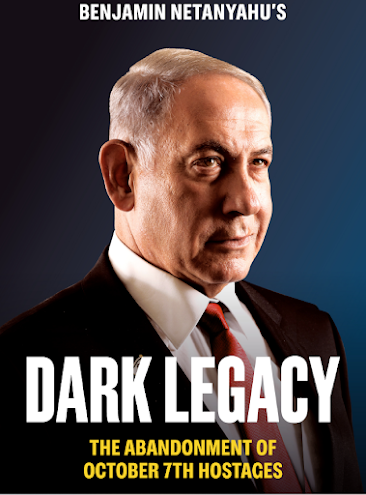
Bibi: Bring the Hostages Back Home and Get Off the StageAdv. Avi KaloFormer head of MIA (Missing in Action) Department, Israel Defense Forces Intelligence Branch.
History, it seems, has a haunting tendency to repeat itself, but in increasingly terrifying and powerful ways.Following the Yom Kippur War, the Golda Meir administration rapidly crumbled. Its leaders resigned, were fired, and vanished into obscurity, never to return. High-ranking military officials, including Army Chief David "Dado" Elazar, paid a heavy price for that catastrophic failure. Now, fifty years later, history's grim ghost returns, draped in horror, death, and mourning, as the nation endures its worst security failure since the Holocaust. Over nine months have passed since that dark day, and the government, along with its leader, seems intent on dodging accountability - a double escape.The first escape is institutional: The government and its head consistently refuse to take responsibility for the massacre and its devastating aftermath. They are desperately avoiding an official investigation that would inevitably point to the prime minister as the chief culprit, potentially ending his and his colleagues' political careers. The second escape, entwined with the first, yet far graver, is the failure to bring back the hostages. In their monumental fiasco, the government, particularly its leader, has been doing everything possible to evade, confuse, and delay both the enemy and the public, avoiding a hostage deal that would irrevocably tarnish their political future.In essence, between the proverbial rock and hard place of Bibi’s political survival and personal ambition, lies a bloody space where the hostages are neglected. This space, unprecedented in Israel's history, marks a profound breach of trust between the State and its citizens. Meanwhile, the ruling elite continues to feign efforts to secure the hostages' release, despite the fact that their failures led to the kidnapping of many civilians and soldiers.Bibi, it’s not too late, even though the hour is indeed late. You have one last choice, timed by the rapidly dwindling hourglass of our hostages’ lives: make the deal to bring them back. Yes, this deal may lead to the collapse of your extremist and messianic, anti-Zionist government, and possibly spell the end of your political career. Yet, these concerns pale in comparison to your profound moral duty as prime minister to those taken captive under your watch. It is your duty to ensure their right to freedom and life.Close the deal now. Accept the political repercussions, and if necessary, step down from the political stage for good. Only then will history show you any measure of kindness - as a leader responsible for failure but also for the hostages' rescue.Otherwise, if you persist on your current path, sabotaging any potential deal, history will judge you harshly. Your legacy, drenched in blood and reminiscent of the darkest eras, will be one of knowingly allowing Jews to be murdered.The time is now. There is no other. The choice - bound by time and by the blood of our captive brothers and sisters - is in your hands.

Acronyms and Glossary
ICC - International Criminal Court in the Hague
IJC - International Court of Justice in the Hague
MDA - Magen David Adom - Israel Ambulance Corp
PA - Palestinian Authority - President Mahmud Abbas, aka Abu Mazen
PMO- Prime Minister's Office
UAV - Unmanned Aerial vehicle, Drone. Could be used for surveillance and reconnaissance, or be weaponized with missiles or contain explosives for 'suicide' explosion mission
Join my Whatsapp update group https://chat.whatsapp.com/IQ3OtwE6ydxBeBAxWNziB0
Twitter - @LonnyB58 Bluesky - @lonny-b.bsky.social
Twitter - @LonnyB58



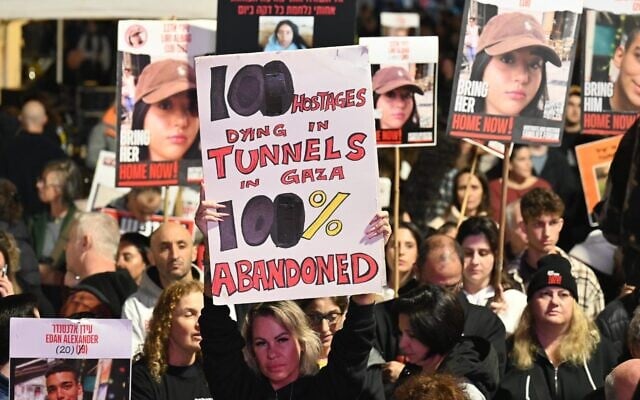
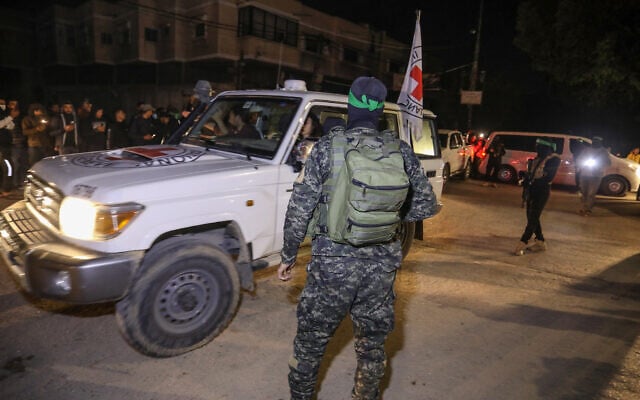
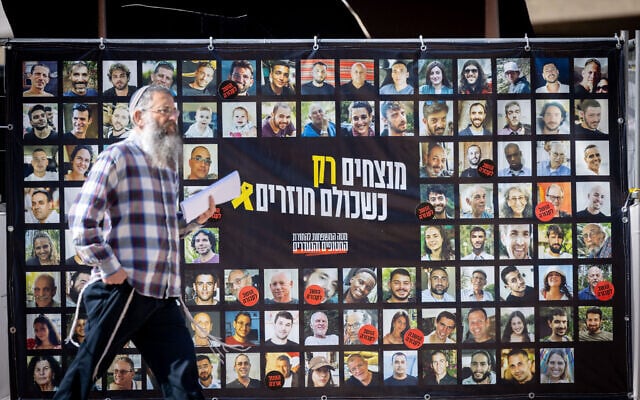
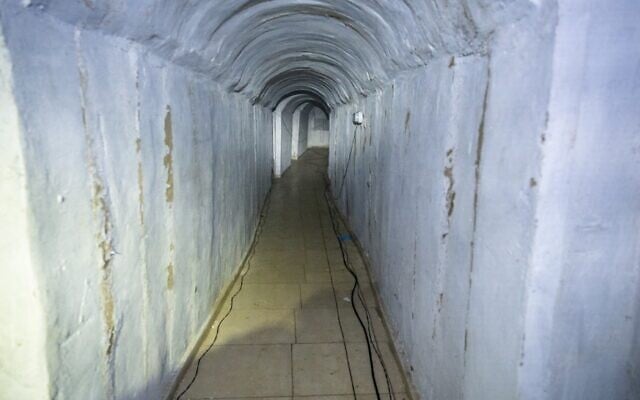
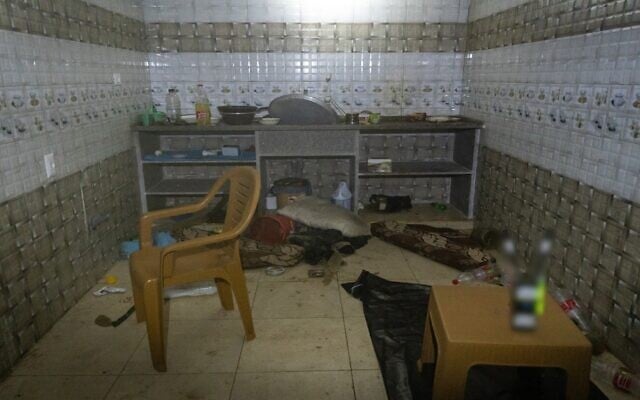

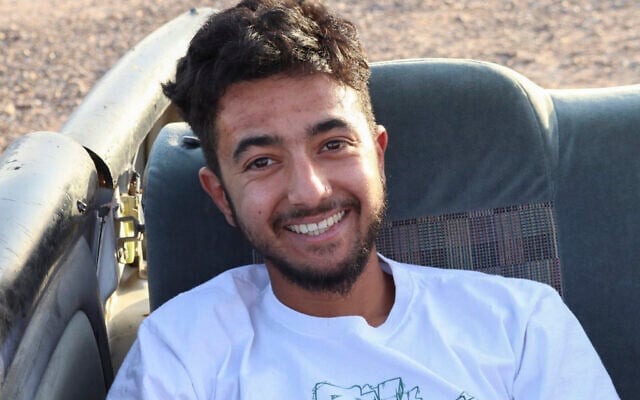
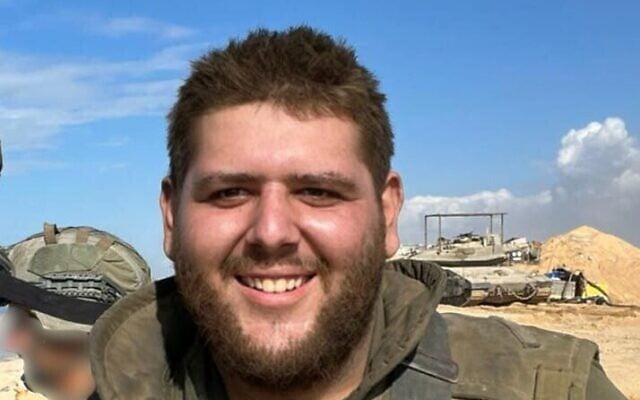
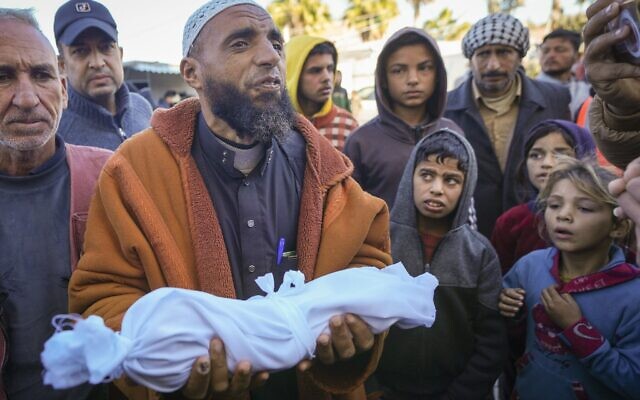
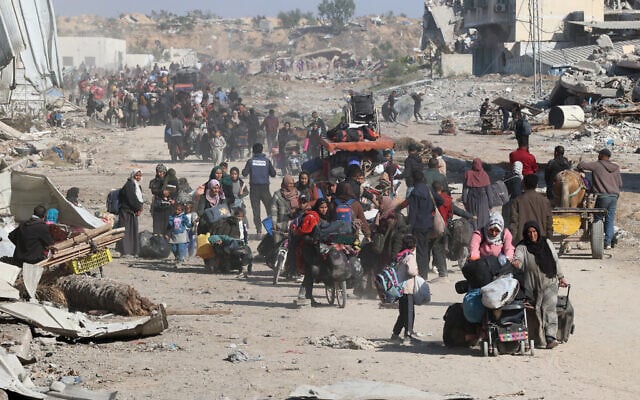
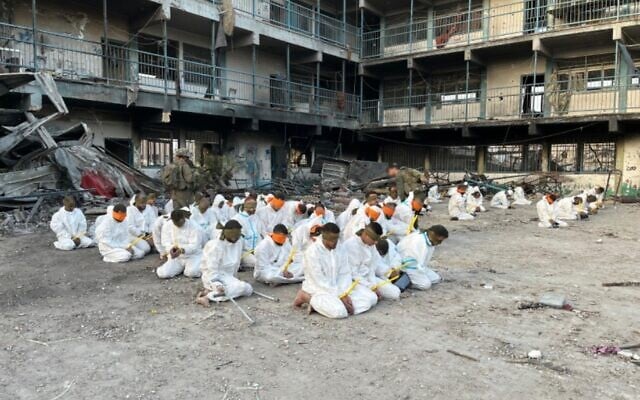





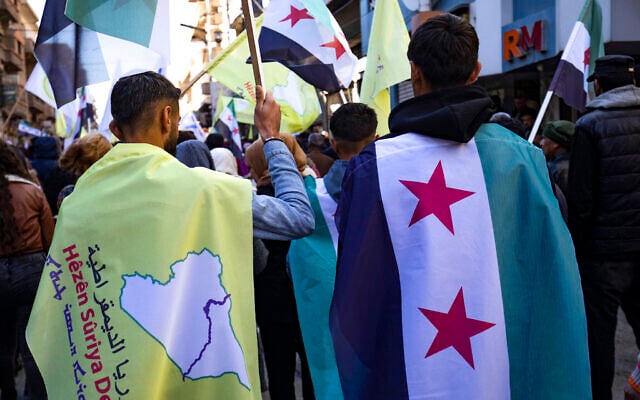









Comments
Post a Comment